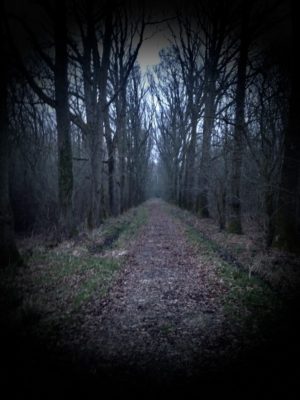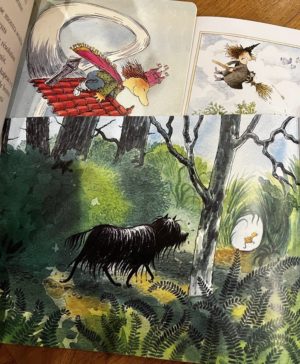Woodism and woodist ideas, which stigmatise woodlands

"We're not out of the woods yet..." said Chancellor Jeremy Hunt in February 2023, warning that the British economy was still in danger. It was widely reported by the BBC in ways that indicated the metaphor was apt and reasonable. Hunt was unconsciously referring to the common idea that woodlands are dangerous and should be avoided, and that when we are out of the woods everything will be okay.
This is in the same vein as stories like Little Red Riding Hood where she is warned not to talk to strangers when she has to go through the woods, and "woodist" notions like this are conveyed when the storyteller says "the woodcutter was never seen again after he entered the forest.". This fear of woodlands runs very deep in our culture and creates a genuine barrier to their conservation and enjoyment. Unfortunately Jeremy Hunt reinforced this fear, probably unwittingly. Such prejudicial language is perverse for a government which has just tried to burnish its environmental credentials with the 2023 Environmental Improvement Plan, part of which aims to "Enhance beauty, heritage, and engagement with the natural environment". It's also surprising to hear such woodist language when the Forestry Commission's tree planting grants are over £2,000 per hectare higher where public access is given. More positive language about woodlands will be needed to achieve the Forestry Commission's aim of "boosting the country’s woodlands and timber industry."
But Jeremy Hunt's prejudice and woodism is not new - for centuries people have feared the 'big bad wolf' lurking in the woods and the witch who is said to live in the forest. Ideas of enchanted forests with traps and dangers are pervasive throughout literature and across the world. In the past, people feared wild animals in woodlands that could attack and they knew that the forest is home to many dangerous plants and poisonous mushrooms, and in some cultures there are spirits of the forest which can be easily angered. Many others in authority use similar imagery to Jeremy Hunt. A Time magazine article by James Stavridis in January 2023 starts with a woodist stance: "Sadly, in these not-so-United States, we have found our way deep into a dark forest, and the question before us is how do we find the path out of this dangerous thicket into which we have wandered?". Phrases like this which fight against nature are rife such as the expression that a report will be 'kicked into the long grass" implying to a place where no one wants to be. Other anti-nature sayings are, "going feral" or "nipping problems in the bud".
 Many traditional stories indoctrinate children from a very young age such as the story of Hansel and Grettel who got lost in the woods leading to their being eaten by a witch. And there were the three little pigs who were afraid of the wolf in the woods. Stories make people fear getting lost and trapped in woodlands, having heard of Rapunzel who was trapped in a tower in the middle of the forest. At least they were a place of refuge for Snow White who hid in the woods to escape the evil queen, or for Robin Hood and his band of outlaws who lived in Sherwood Forest. And it's not just older stories that convey that impression - Maurice Sendak's 1963 bestseller, "Where the Wild Things Are", tells an allegorical story of a boy who misbehaves and is sent to his bedroom without his supper. But the tale is also about mood and behaviour: the woodlands which appear to grow in Max's bedroom are associated with him going onto a dark place. Although it's sold as a children's book, it's just as much an adult's story, and it reinforces that strong link between woodlands and bad things.
Many traditional stories indoctrinate children from a very young age such as the story of Hansel and Grettel who got lost in the woods leading to their being eaten by a witch. And there were the three little pigs who were afraid of the wolf in the woods. Stories make people fear getting lost and trapped in woodlands, having heard of Rapunzel who was trapped in a tower in the middle of the forest. At least they were a place of refuge for Snow White who hid in the woods to escape the evil queen, or for Robin Hood and his band of outlaws who lived in Sherwood Forest. And it's not just older stories that convey that impression - Maurice Sendak's 1963 bestseller, "Where the Wild Things Are", tells an allegorical story of a boy who misbehaves and is sent to his bedroom without his supper. But the tale is also about mood and behaviour: the woodlands which appear to grow in Max's bedroom are associated with him going onto a dark place. Although it's sold as a children's book, it's just as much an adult's story, and it reinforces that strong link between woodlands and bad things.
Much of the recent work to reduce people's prejudices around race and sexual orientation are fighting long-held and widespread stereotypes. Ideally "woodist" language like Hunt's should be called out in the same way that racist and sexist language is - and despite woodist language showing a prejudice against nature rather than groups of people, it still affects how we view our world and how we behave towards others. Perhaps we need a new lexicon of more positive language around woodlands, encouraging terms like "rewilding" and "greening". Even the more jargony terms like 'eco-services' and 'biodiversity' are positive although it's more than better language which we need as an antidote to the woodist expressions of Jeremy Hunt. What is needed is to make politicians ashamed of using woodist expressions and ask them to spend more time, well, in the woods.
Comments are closed for this post.
Discussion
I think the term “forest bathing” is helpful.

This a little bit hysterical in my opinion. People either like nature or they don’t. Changing this language will not help. Educating our children the importance of trees in our very own existence needs to change.
My neighbour has not even moved in yet but has felled over ten healthy trees. Why? he doesn’t like the mess leaves make. Was this because he was read Red Riding Hood or Hansel and Gretel? I suggest not. This man in his 60s is simply a nature hater. You will never change his view, now matter how you talk to him.
I love trees and woods even in the dark. I took Mr Hunt’s comments for exactly how they were meant. Do you really think these words reinforce or have any detrimental effect on a person’s opinion of woods. If a person is effected by such language or tales etc I welcome them not entering wooded areas. Stay away. Stay in your ‘safe’ urban concrete jungles. Keep your rubbish with you, keep your barbecue and your kites. Stop your interfering with wildlife. You clearly can’t be trusted so why would I want to change anything to encourage you into my sanctuary.
Society needs to change. The mantra of build, build needs to stop. We do need more homes but the population keeps growing. The country seems to want this as it is obsessed with growth. Hamlets are becoming villages and villages becoming towns and so on. Our farm land and woods are being built on to accommodate more people. So I suggest we don’t need to be censoring our language but we need to be talking more truth and stop living in fear of offending people.
The real refugee crisis is wildlife. The squeeze on land is forcing species out of their homes.
Jason Lilleystone
27 February, 2023